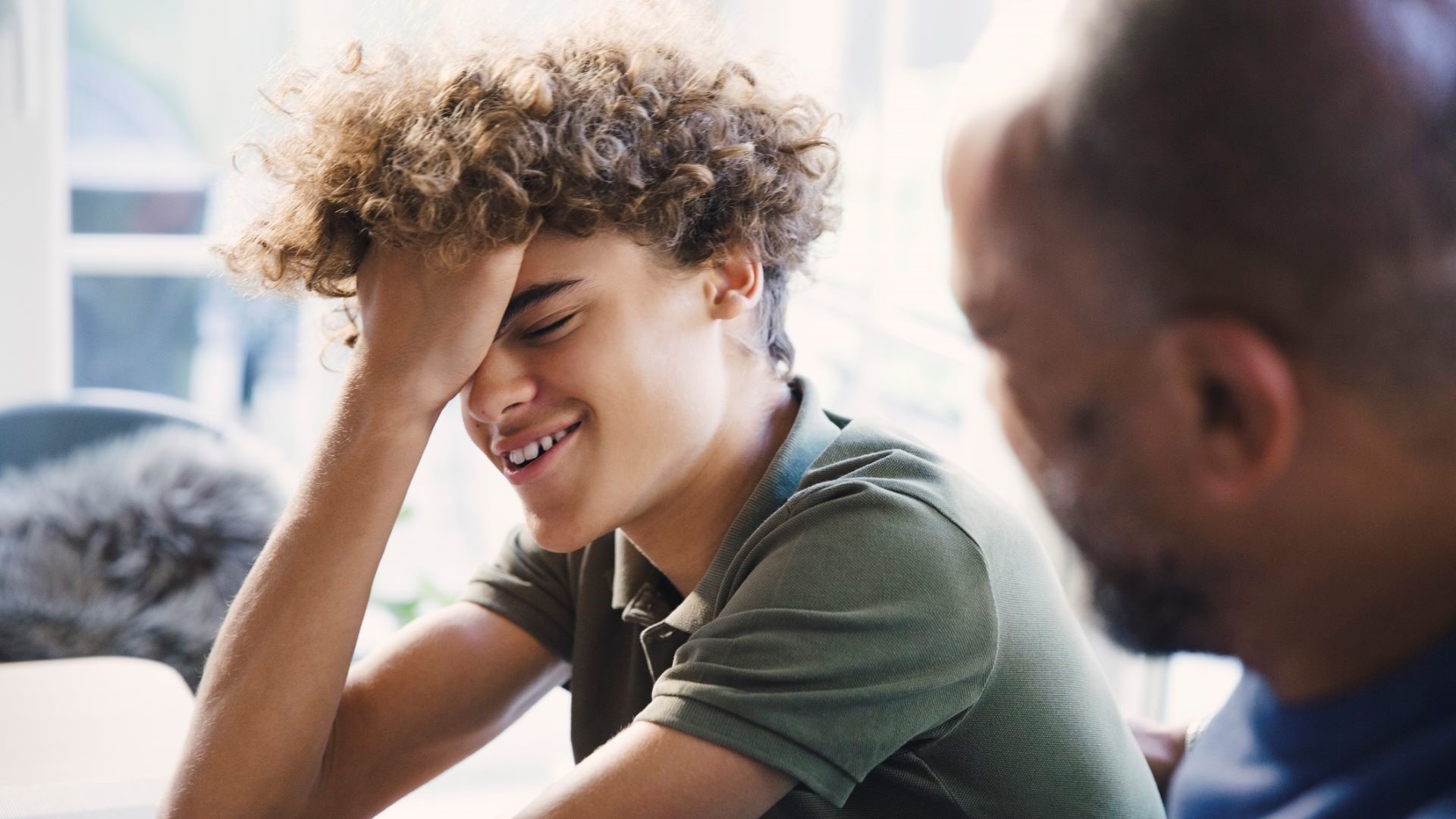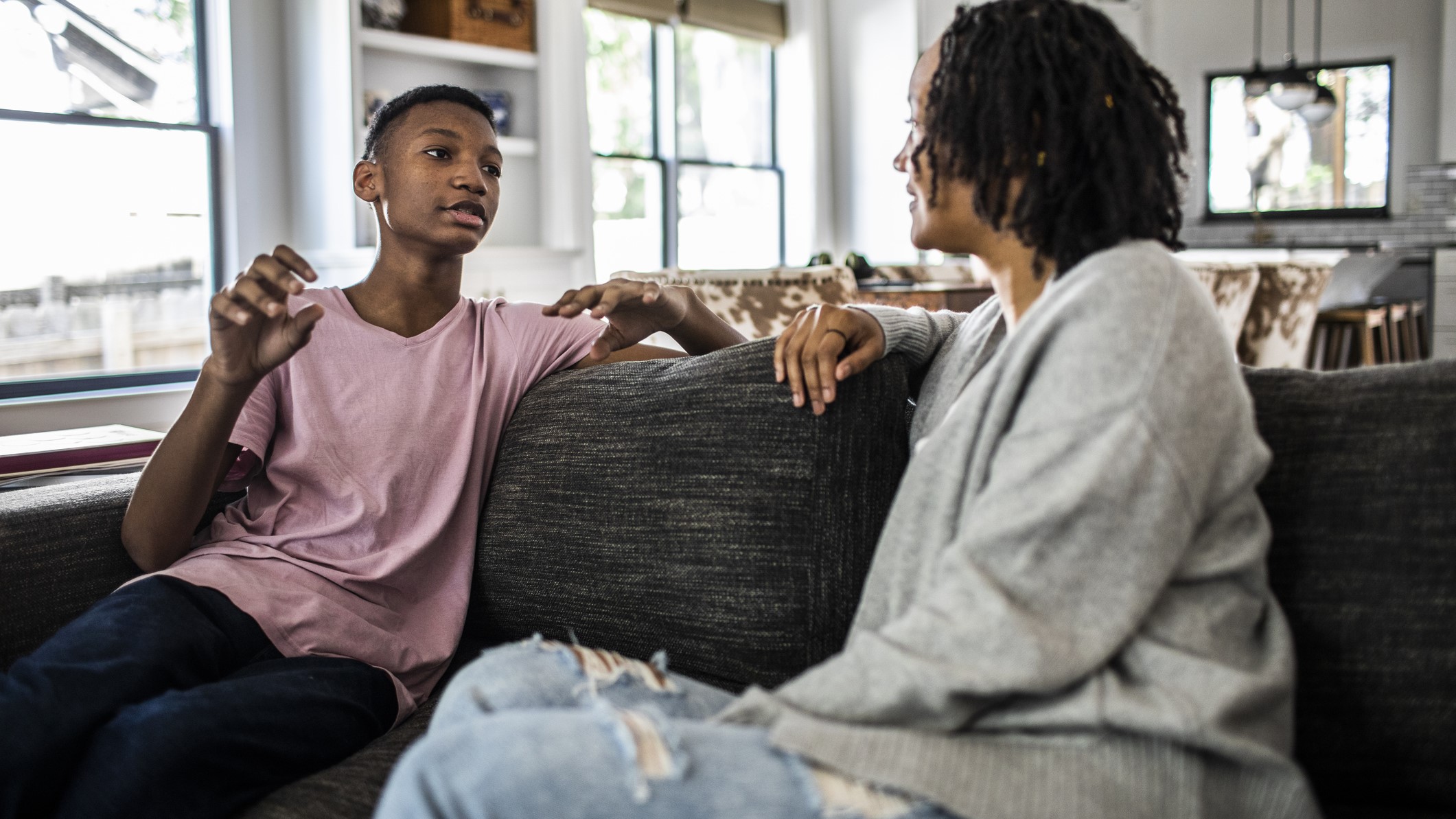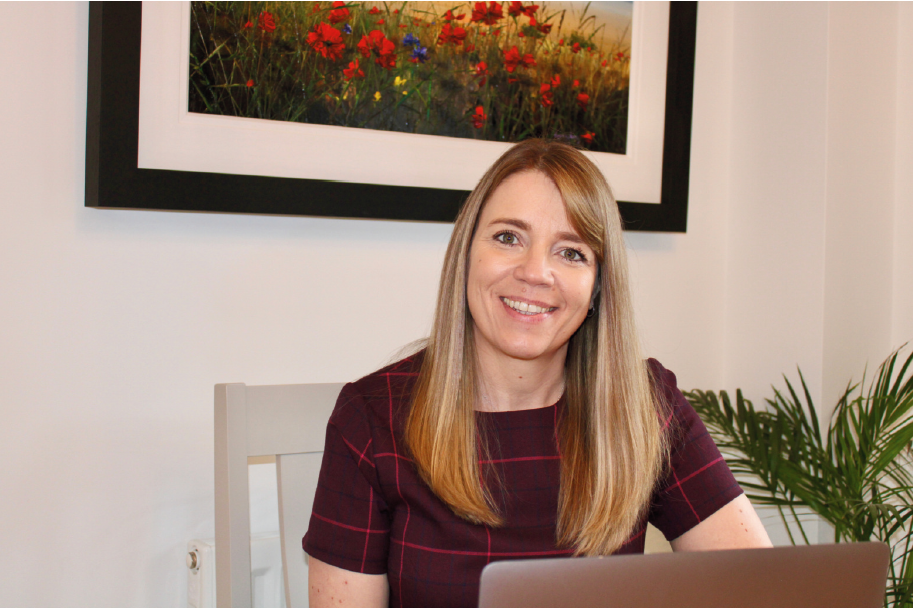When and how to talk to your child about sex - plus top tips from child psychotherapists
Does your child have questions about the birds and the bees? Here's how to start talking about sex with your children, with expert advice to help you out.


Parenting advice, hot topics, best buys and family finance tips delivered straight to your inbox.
You are now subscribed
Your newsletter sign-up was successful
If you're wondering how to talk to your child about sex then first, congratulations on trying to break the parenting cycle. If the thought of talking openly about sex with your kids feels awkward know that this makes sense if you never had this with adults in your life. It's great that you recognise that they learn about sex and the facts of life from a trusted source, instead of in the playground or online. So, let's get into it.
But feeling uncomfortable, not knowing what to include in 'the talk' or how to talk about it are just some of the primary motives that stop parents from talking to their children about sex. And while it's true that with more inclusive sex education being taught in schools from this year onwards and there's a big chance that you won't have to cover as much ground as you might have, all children will likely leave those lessons with more questions than answers.
We chatted to Kemi Omijeh who is a BACP registered psychotherapist and clinical supervisor, she told us: "Talking about sex should be done alongside talking about healthy romantic relationships and consent. Talking about sex differs from talking about body parts - the two often get conflated. Children show curiosity about their body at a young age - it’s important to give children the correct names for their body parts, not nicknames. This supports with body autonomy, consent and safeguarding children. It provides a good foundation for later discussion on puberty and sex.
You might have already touched on talking about sex with your children at home, or at least covered the basics around puberty like body changes, but don't presume that one chat is enough. While not all teenagers will be having sex from the moment they turn 16, it's important that if and when they do, they are prepared properly with accurate information and advice to make decisions for themselves. Here's how to get started with talking to your children about sex...
How to talk to your child about sex
Sticking to need-to-know information is the best way to go, says relationship counsellor and sex therapist at Relate, Ammanda Major. "As with any questions a child might have, it's important to answer them in an age appropriate way. It’s something around choosing appropriate language and knowing that it’s okay to ask questions and dealing with the questions and not overloading the child with additional information, going very much at their pace."
"If it's factual information like where babies come from, I think most parents could have a go at explaining that." She adds, "But it's about the language that you use and about encouraging the sense that it's important to feel comfortable in a sexual context, important to feel close to someone and feeling safe enough to be sexual and not about doing things that you don't want to do.
"If you talk to your child in an embarrassed and cut-off way, the child is going to pick up that it's not really okay to talk about this stuff. I think children are naturally curious a lot of the time so they are going to come home with queries and questions or observations. They may ask you about your relationship, so [in that case] it’s how much is appropriate to share with a child about what’s private between you and partner."
Parenting advice, hot topics, best buys and family finance tips delivered straight to your inbox.
If your child comes home wondering where babies come from or with more intricate questions, it's best to be prepared with something to say. Especially as a recent poll by the Sex Education Forum suggests that young people actually receive the majority of their relationships and sex education at home, across a huge range of issues from 'how to tell if a relationship is healthy' and dealing with puberty to 'pregnancy options' and contraception. It's these types of conversations that can help keep children safe as they are growing up, with statistics showing that those who receive 'effective' relationships and sex education more likely to delay sex until they are ready, use contraception and are less likely to have an unwanted pregnancy or an STI.

By doing this, you're making it clear that they can go back and ask any questions anytime, and that you're not going to tell them off for doing so. "So that they know it's okay to talk about sex an relationships. It's about making yourself available. Not every parent finds it easy to talk with their child about this topic and so you know, perhaps giving a bit of thought beforehand if you know your child is having these lessons at school and thinking about how you might approach the questions."
But if you're finding it all a little awkward, that's completely normal. Ammanda says, however, to think about why that's the case. She encourages parents to think over how they feel about talking to their child about sex and relationships and ask themselves, "Do I look forward to [speaking about] it? Or do I feel like it's embarrassing? Do I not want to talk about it because my own relationship is not what I hoped it was?"
Through understanding your own feelings of talking about sex, you'll be able to give a more positive experience to your child. "Just think about how you wish you'd been spoken to about it," Ammanda advises, "And what you would have liked to be different, [that will tell you] how you can help your child understand things in the best way possible that's appropriate for their age group."
What age is the best time to talk to your child about sex?
There are lots of opinions around this, though it really is down to you as a parent, your child and your values and beliefs. As a general guidance, when your child is showing an interest in the topic is a good time to engage in the conversation. This is based on the assumption that the parent has developed a good relationship with their child that allows the child to come with their curiosity and questions.
Kemi agrees; "This should predominantly be a parental decision. It will be influenced by their own experiences and how they were parented around talking about sex and cultural factors like religion."
She goes on to add the importance of having information early ,"Being informed early about sex, doesn't harm children nor is it the same as giving them license to engage in sexual intercourse. These are common misconceptions from adults who are engaging with the topic through their own lens and experiences."
20 tips for talking to children and teens about sex and relationships
How to talk to children under 13 about sex
- Put yourself in their shoes - As Ammanda says, think about how you were told about sex. Was it informative? Or was it an uncomfortable sit down with a parent over the dinner table? By thinking about what you would have wanted when you were your child's age is one of the best ways to start thinking about having the talk. You might even decide that you're not going to do it at all, but instead give them a book to read (scroll down for the best ones to buy) or pass the baton onto someone who might have a more suitable relationship with the child. It doesn't always have to a parent who has the chat. Also when it comes to talking to children about sex, it's worth thinking about what you wanted to know before your first sexual encounter. Just because you talk to your child about sex really doesn't mean that they are going to rush off and have it. Talking openly and giving them accurate information will take away the mystery and confusion around sex and help them make safer, healthier choices throughout their life.
- Just have a chat - If you bring sex into everyday conversation it will be so much easier to talk about, so don't make a big fuss about it and insist on sitting down and having a 'serious talk'. Your teenager may run a mile. Instead, just mention things when they pop into your head. You could talk about relationships on TV soaps, news stories about teenage pregnancy, and use cues to bring up difficult subjects such as sexual abuse or masturbation. If it's part of your normal discussions, this will help your child to feel confident about talking about sex with you.
- What do they know already? - You'll probably be amazed by how much your child has already picked up from their mates, from TV and sex education at school. Find out what they do and don't know, then fill the gaps and put them right on anything untrue they may have heard.
- Help them through puberty - This can be a scary and confusing time for your child. Their body will be starting to change as they are developing, with pubic hair growing and hormones kicking in. With menstruation and growing breasts and wet dreams and voice breaking, it's a lot for children of any gender to cope with. But puberty doesn't happen overnight. It's a series of developments that can take years. Explain to your child what's happening to their body and why. The average age is 12 to 14 in girls and 13 to 15 in boys, but future teens as young as nine or younger are now starting their periods. When you and/or your partner started puberty will be a good indicator of when your child will start theirs.
- Teach respect - Tell them that as well as respecting other people's feelings about intimacy, it's important that they respect themselves and their own bodies too. They may regret doing something they're not ready for. Tell them that their body is private and that no-one has the right to touch them or do anything else that they don't want them to do without their permission. "This was a really important first part of talking to my girls about sex," says Polly, mum of two teenage girls. "Teaching them about consent has to start early, so I started by making sure they knew all about their own bodies, what was appropriate and what wasn't, and making sure they didn't keep any 'body secrets' was how we started, quite early. Making these conversations natural and a part of family life also means they're not such a big deal later on, when you have to talk about puberty, sex and relationships."

- Explain your values - It's important to talk about your moral or religious values with your child. They may not adopt them too but if you explain why you'd be unhappy if they had underage sex, for example, or sex before marriage, it can be a talking point for you both to discuss yours and their beliefs.
- They'll want to experiment - Of course they'll be curious about their bodies once they hit puberty, if not before. Reassure them that it's perfectly normal to have these new feelings of arousal and encourage them to talk to you if they're worried about their development. "I knew my son's school was going to start talking about sex and puberty in Year 6," says Joanne. "But I wanted to be the first person to talk to him about sex, masturbation, pornography and so forth. So I bought him this book, 'Sex is a Funny Word', and we read it together the year before. It made things so much easier as we had a structure to work towards."
- What about sexual feelings? - Feeling sexually aroused is all part of growing up and it's important to tell them that this is natural but give them the privacy they need to figure it out for themselves. As much as it's useful to have lots of information, letting children discover things by themselves is also vital.
- Too embarrassed? - Don't put off talking to your child because you're embarrassed. They probably will be too. Read up on the subject first, whether that in a book or online to find out what kinds of things kids your child's age tend to want to know about.
How to talk to kids over 13 about sex
- Give them the facts - Talking to children about sex is no time to be wishy-washy about the facts of life, but if you're worried you haven't got the latest information - then supply it. That could be either by yourself or even through organisations such as Brook, which offers confidential advice for youngsters under the age of 25 on contraception and sex.
- Getting intimate? - There are many ways that your teenager may become intimate without having full-blown sex. Their first kiss is even an important stage in their sexual development, so try to help them by explaining that they can still show their emotions and experiment without having sex.
- What about love? - Explain that the best setting for sex is in a loving, or at least equally respectful, relationship.
- No, not EVERYONE is having sex - Most young people have sex in a lasting relationship. Recent figures show that three out of every four girls and two out of every three boys haven't had sex by the time they're 16. So no, they're not all doing it! Their mates may have been bragging that they've all had sex already, but tell your child they shouldn't ever feel they have to do something they don't want to do.
- Tell them it's OK to say no - Whatever the situation, whatever they've already said, remind them that they can say no at any time (and their partner can too). Everything should stop then and there. "Things have changed so much since I was a teenager," says Sarah, mum to teenage twin girls. "I never thought I would have to bring up the subject of choking or strangulation during sex, but it's out there, and it is happening. You can't hide from it. Girls need to know that they don't have to agree to these things and a boy who thinks that he can choke girls while having sex needs to be re-educated!"
- Tell them about the law - Explain sexual consent to them and that it is illegal to have sex if they're under 16, especially if their partner is over 16. They could be arrested for having sex with an underage partner, or if they are underage themselves and their partner is over 16, their partner could be in trouble with the law.
- So they've got their first boy/girlfriend? - Try to get them to open up about their feelings. How do they feel about them? Are they just good mates or do they have stronger feelings? Have they been intimate with each other? If they'll admit to that, then talk to them about the consequences.
- What if they fall in love? - Young love can be very painful, but a really important learning curve for your child. Talk to them about their emotions and explain that sometimes relationships can end in tears, and that you're always there for them - even though it may be very difficult for you as a parent to see them be hurt. Try to get to know their partner and include them in your family life. Invite them around for dinner, chat to them too. Let them know that you care about your child's relationship with them and support it.
- Help keep them stay safe - They may not be having an intimate relationship, but sexually transmitted infections have risen dramatically in the last decade amongst young people, so it's important that your teenager knows about STIs and the importance of safe sex.
- What about contraception? - Of course, unprotected sex can lead to pregnancy too, so talk to your youngster about the dangers and contraceptive choices. It's very important that boys are equally aware of the importance of contraception and act responsibly when it comes to an intimate relationship. Offer to go with your teenager to your local sexual health clinic or doctor to talk about contraception.
- What about pregnancy? - Naturally talking to children about practicing safe sex is the best way to avoid this. But if it does happen, be sure to stay calm and support your child - no matter their role in it as best as you can. Take your child to see your GP, as they will be able to confirm the pregnancy and offer advice. Of course, you can give advice and support, but your child and potentially their partner as well have to make their own minds up on what to do about the pregnancy.
10 conversation starters about sex
Here are some conversation starters to help you talk to your kids about sex:
- "I remember being your age and having questions about my body. Is there anything you're curious about?"
- "Have you heard anything about sex from your friends or at school that you'd like to discuss?"
- "I noticed this scene in the movie we just watched. What did you think about how the characters acted?"
- "As you're growing up, your body will start changing. Would you like to know more about what to expect?"
- "Sometimes people online talk about sex. Have you come across anything you didn't understand?"
- "It's normal to have feelings for others at your age. Do you want to talk about relationships?"
- "I saw an article about sexting. Do you know what that is? Let's discuss why it can be risky."
- "Everyone deserves respect in relationships. What do you think makes a relationship healthy?"
- "If someone ever makes you feel uncomfortable, even online, you can always talk to me about it."
- "There's a lot of incorrect information about sex out there. What have you heard that you're unsure about?"
How does social media affect how kids see sex?
Social media can have a significant impact on how kids understand sex and relationships. It's natural to feel overwhelmed or even scared when we consider how social media exposes our kids to explicit content, unrealistic expectations, and peer pressure before they're ready. We worry about them encountering misinformation, facing pressure to sext, or even becoming targets for online predators. It's okay to feel concerned - these are real issues shaping our children's attitudes and behaviours.
However, there's no need to feel powerless - there are lots of proactive steps you can take to raise your kids in an environment of open, honest communication about sex and online safety. By monitoring their online activity, promoting positive self-image and modelling responsible behaviour ourselves, we're building their confidence to make good decisions and helping them stay safe online.
What if my kid doesn't want to talk about sex?
While you might feel like now is the best time to chat to your child about sex and relationships, they might not feel the same and that's absolutely fine. Children become curious about the birds and the bees at different ages, depending on their own development, who they spend time with and what is spoken about both inside and outside the home. The best thing to do in this case is, as our expert Ammanda suggests, make the space for them to come back at another time and ask questions by reminding them that it's okay to talk about these things.
If you've decided to bring the topic up because they are having classes about it at school, but they aren't keen to talk to you about it, then you can rest easy that they are getting accurate information from their teachers. But if you want to know more about the curriculum and what they'll learn, reach out to the school and request some more information.
Alternatively, you can offer them information yourself from one of the many great sex education and puberty books out there.
How to talk to kids about pornography
Talking to your children about pornography can feel daunting. It's a sensitive topic that many of us weren't prepared for by our own parents. However, one in four kids have seen it by 11, and one in 10 have seen it by the age of 9, so it's an essential conversation to have.
Starting these conversations early, even as young as 5, might seem shocking. But don't worry – we're not suggesting explicit talks. It's more about laying a foundation of trust and open communication. Your child needs to know they can come to you with anything that makes them uncomfortable online.
"I tell parents to start three years before they think their child will need the information,” says victim advocate and student safety expert Carrie Pasquarello. “It's a lot easier to have a conversation about prevention than it's to have a harder conversation after a person is victimised. Unfortunately, kids are often only just one easy click or tap away from pornography. So, the conversation should start today.”
For younger kids:
- Keep it simple and age-appropriate
- Use everyday moments for casual chats
- Try not to overreact if they tell you they've seen something online
- Focus on body safety and what to do if they see something unsettling
As they grow older, the conversations can evolve and you can start to have conversations around:
- How porn deals with issues of consent and violence
- How sexual identity can often be ignored by 'mainstream' porn
- How porn isn't a reflection of 'real sex or or 'real' bodies
We've got more expert tips and advice in our parents' guide on How to talk to your kids about porn.
Featured experts

Nicola is a counsellor, supervisor, trainer, and founder and creator of The Empowered Parenting Programme. She is also an accredited member of the British Association for Counselling and Psychotherapy (BACP).

Kemi Omijeh is an experienced BACP registered psychotherapist and clinical supervisor who has worked with children and families for over 14 years. She is also a trainer, and speaker with her specialist subjects being cultural competence, racial identity, racial trauma and antiracist practices in education. Kemi champions inclusive mental health for children and young people, and states that support for young people should include a consideration of the child’s context, culture and identity.

Carrie Pasquarello, CEO and Co-Founder of Global Secure Resources Inc. is a victim advocate who took her overseas experience with the State Department and turned it into a platform to help others navigate safety. She spent 12 years in Europe and Asia and, in the process, developed a system to keep the most important people in your life safe. She was invited to the White House to discuss student safety and fiercely advocates for legislation protecting students abroad. She developed an Individual Travel Assessment Plan (ITAP) and a Safe Student Abroad Assessment (SSAA) to mitigate risk for travelers.
If you struggle to connect with your teenager, here are 25 brilliant ways to open up a conversation with them, with plenty of advice from our experts. Plus, here are the five most important things you should talk to your teen about before they start dating, and what to do if your teenager is drawn to taking risks.
Joanne Lewsley is mum to a tween, and freelance copywriter and editor who creates parenting, health and lifestyle content for evidence-based websites, including BabyCentre, Live Science, Medical News Today and more.